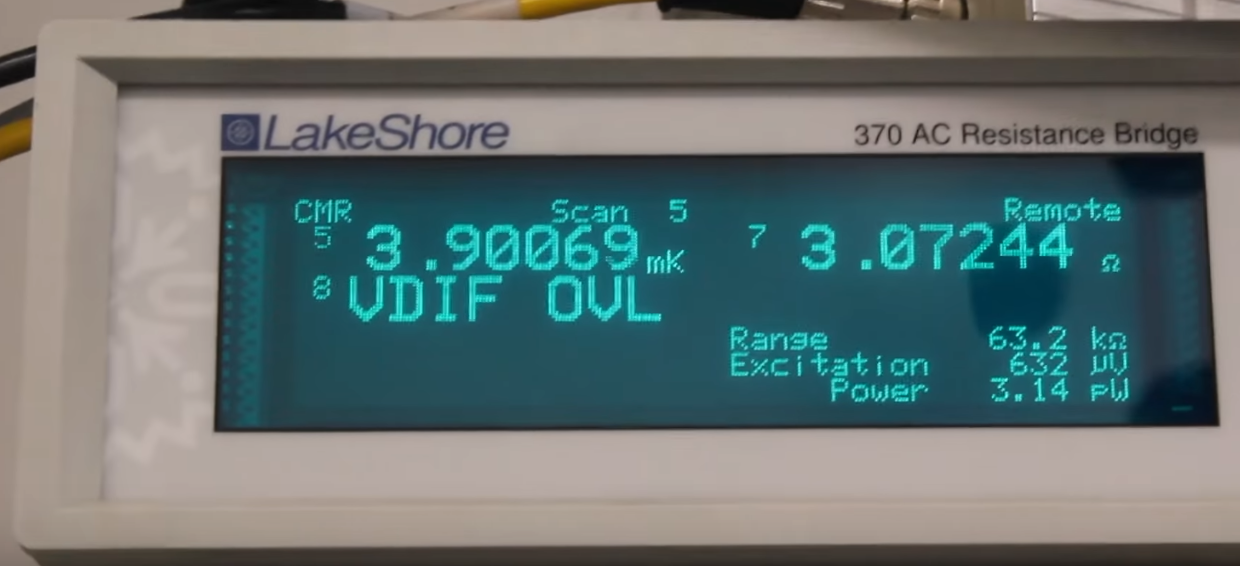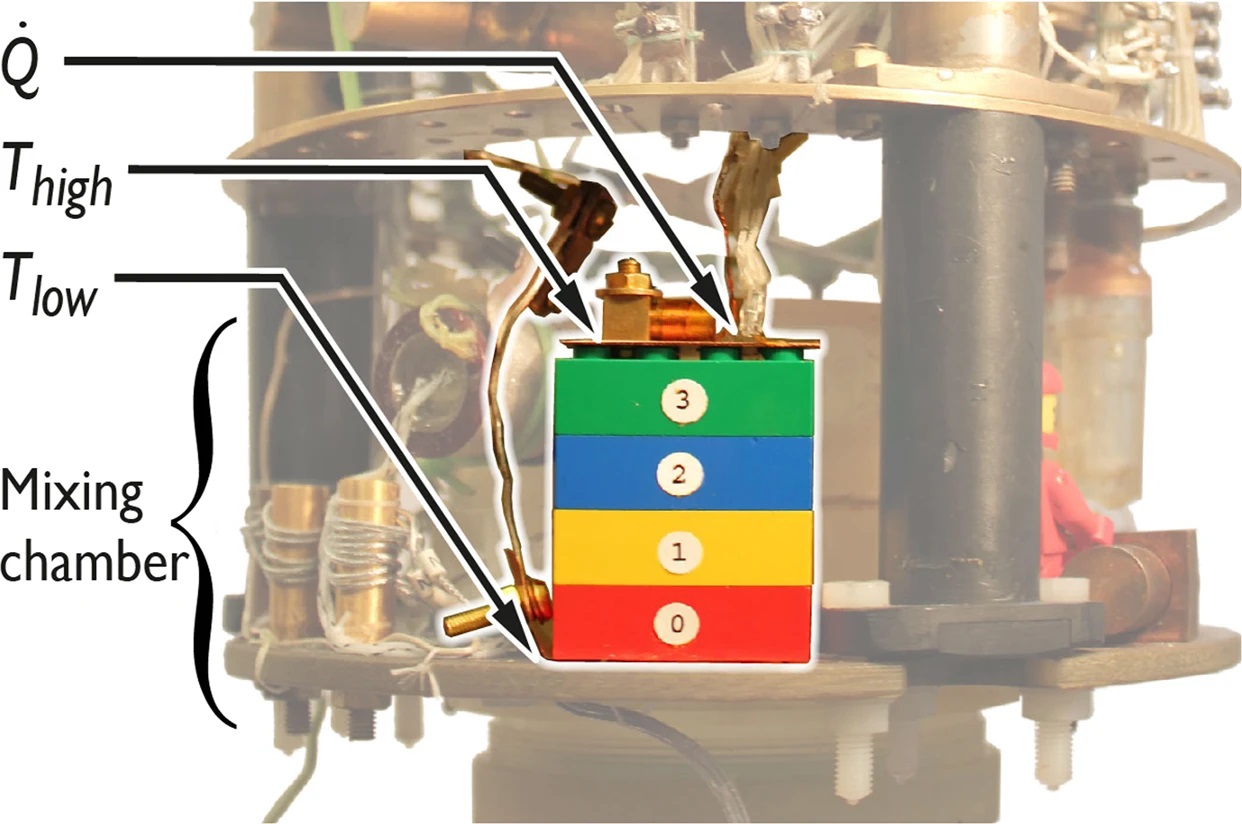Lego Cryonaut Found a Way to Make Quantum Computing More Affordable
Makes for a good thermal insulator.
A major issue in the development of Quantum computers is finding affordable ways to produce thermal insulators, but it turns out there might be an unusual candidate to bring these costs down: Lego.
This was figured out by researchers from Lancaster University, who decided to try to figure out just how cold a Lego set could get. The findings were published in the journal Scientific Reports. To do this, they had one Lego mini figure dubbed the 'Cryonaut', as well as a stack of four ordinary 2x4 bricks. These were cooled using the dilution refrigerator at Lancaster University, which currently holds the record for being able to produce the coldest temperature in the world.

How cold is that? The fridge is capable of reaching a temperature as low as 1.6 millidegrees above absolute zero (-273.15 degrees Celsius, or -459.67 degrees Fahrenheit) which is is 2000 times colder than deep space. The Lego figures didn't quite reach this level of cold, but made it to 3.9 millidegrees above zero.
The researchers found that the ABS plastic used to produce Lego actually makes a very good insulator.

"Our results are significant because we found that the clamping arrangement between the Lego blocks causes the Lego structures to behave as an extremely good thermal insulator at cryogenic temperatures." said the team leader, Dr. Dmitry Zmeev. He added: “This is very desirable for construction materials used for the design of future scientific equipment like dilution refrigerators.”
Dilution refrigerators are currently rather expensive to build, but they're critical to various developments in physics including progression in quantum computing -- so, bring down the cost of building a dilution refrigerator, and it can become a more accessible tool for researchers to use in the development of quantum computers.
Who knew that a Lego Cryonaut would make such discoveries?
Get Tom's Hardware's best news and in-depth reviews, straight to your inbox.
Niels Broekhuijsen is a Contributing Writer for Tom's Hardware US. He reviews cases, water cooling and pc builds.
-
bit_user Wow, I'm pretty sure that figure is wicked old skool. Like, 1st gen Space Legos. The professor probably got it from his attic.Reply -
Crashman 2000 times colder than deep space makes no sense without a reference point. That's because "colder" is a negative and temperature is a positive. So if liquid helium were 4.22K and deep space were 4.218K, 2000 times colder could be 0.218K.Reply
I don't blame this author but the original source: Without a reference point, we're treating science as marketing. -
bit_user Reply
The reference point is obviously 0 degrees Kelvin. So, I guess your point is that it should've been written "1/2000th as cold as"? Or, since we're being pedantic, "1/2000th as warm as"?Crashman said:2000 times colder than deep space makes no sense without a reference point.
Fair, I suppose. But, a nit-pick, none the less. -
Crashman Reply
It's far, far worse than that. The measurement is of heat, so it would be 1/2000th as warm as, so calling that argument pedantic is...pedantic. But the way it's written, it actually doesn't make any sense. It's worse than my "use 4x less toilet paper" experience, where four roles didn't magically appear when I finished the first one, because at least I had a one-role reference point.bit_user said:The reference point is obviously 0 degrees Kelvin. So, I guess your point is that it should've been written "1/2000th as cold as"? Or, since we're being pedantic, "1/2000th as warm as"?
Fair, I suppose. But, a nit-pick, none the less. -
bit_user Reply
Right.Crashman said:It's far, far worse than that.
Well, do try not to let it ruin your holidays.
🎅 -
Crashman Look, when I was starting they had an article about a CPU that used 50% less power than the previous version. But the article showed that the old CPU used 50% more power than the new one. Which meant that the new version used 33% less power than the old one.Reply
Now this was a headline, so I took it to management. The statement discredited Tom's Hardware as a serious site for computing enthusiasts (math, get it?). And after going back and forth about how math works for a couple days, Management came to the conclusion "they just do math differently in Europe". -
bit_user Reply
That's unfortunate, and rather more consequential than this holiday fluff piece. They really should've corrected it.Crashman said:Look, when I was starting they had an article about a CPU that used 50% less power than the previous version. And then they showed that the old CPU used 50% more power than the new one. Which meant that the new version used 33% less power than the old one.
Now this was a headline, so I took it to management. The statement discredited Tom's Hardware as a serious site for computing enthusiasts (math, get it?). And after going back and forth about how math works for a couple days, Management came to the conclusion "they just do math differently in Europe".
Anyway, seriously, Happy Holidays!
🎅 -
margrave Thank you for calling BS on this.Reply
The news media are full of it, and I (we all?) expect it.
But Tom's is not the place for BS.Crashman said:It's far, far worse than that. The measurement is of heat, so it would be 1/2000th as warm as, so calling that argument pedantic is...pedantic. But the way it's written, it actually doesn't make any sense. It's worse than my "use 4x less toilet paper" experience, where four roles didn't magically appear when I finished the first one, because at least I had a one-role reference point. -
Crashman Reply
I don't expect our news writers to all be so fussy as to rephrase the numbers so that they make sense. I still blame the source.margrave said:Thank you for calling BS on this.
The news media are full of it, and I (we all?) expect it.
But Tom's is not the place for BS.
Yes, I did later check with Google and a calculator, it is 1/2000th the "temperature" of deep space.
